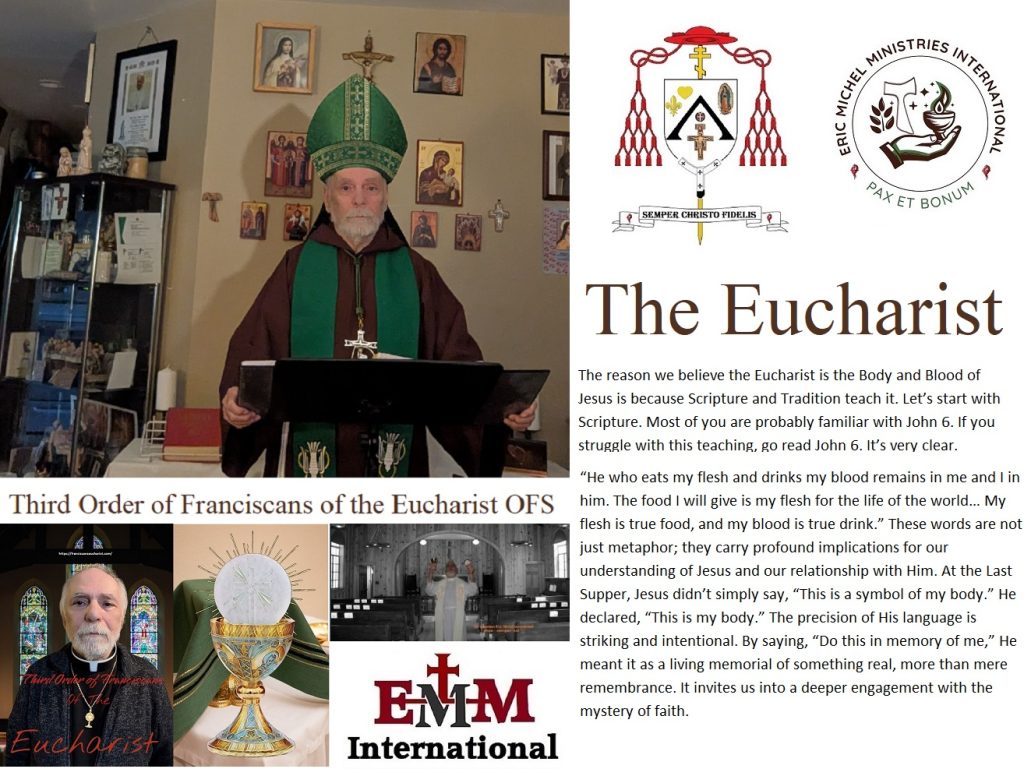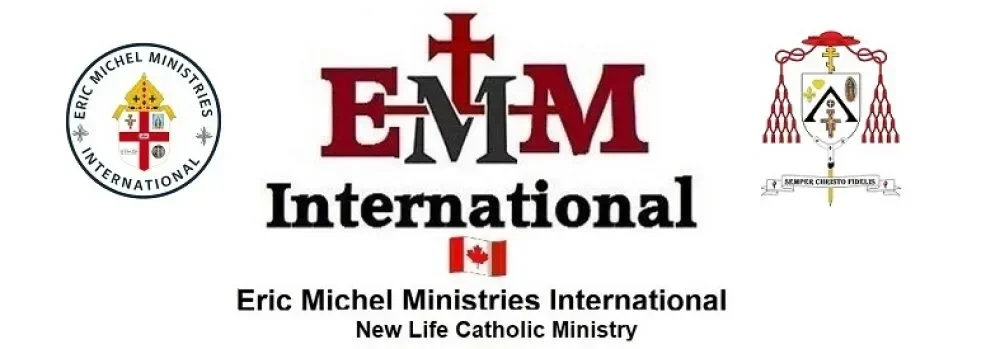
The reason we believe the Eucharist is the Body and Blood of Jesus is because Scripture and Tradition teach it. Let’s start with Scripture. Most of you are probably familiar with John 6. If you struggle with this teaching, go read John 6. It’s very clear.
“He who eats my flesh and drinks my blood remains in me and I in him. The food I will give is my flesh for the life of the world… My flesh is true food, and my blood is true drink.” These words are not just metaphor; they carry profound implications for our understanding of Jesus and our relationship with Him. At the Last Supper, Jesus didn’t simply say, “This is a symbol of my body.” He declared, “This is my body.” The precision of His language is striking and intentional. By saying, “Do this in memory of me,” He meant it as a living memorial of something real, more than mere remembrance. It invites us into a deeper engagement with the mystery of faith.
In John 6, Jesus doesn’t shy away from the weight of His words. He actually allows people to walk away when they struggle to accept this teaching. That’s rare in the Gospel narrative; usually, His aim is to draw people closer, to enlighten them rather than push them away. This highlights the importance of understanding the Eucharist with sincerity; it is not a casual concept. It challenges us to explore the depths of faith and commitment as we contemplate this profound mystery.
So—why should you care? First, if this is true, then God literally lives in our churches. He’s not just in Heaven, far removed from our lives. He’s here, present in a tangible way. This isn’t limited to the realm of philosophical ideas; it is a matter of relationship. You can go see Him. You can approach Him in prayer and contemplation. The red candle burning in every Catholic and Orthodox Church signifies this very truth: it means Jesus is there, inviting us into communion with Him.
Second, a more theological reason emerges: the Eucharist reveals that God deeply desires to transform this world. It underscores a reality that often feels obscured by our daily struggles and distractions; that God is actively working within creation to bring about renewal and redemption. Gregory Palamas, a monk from the 1300s, talks about this beautifully. He suggests that we’re not so different from the world around us. Our bodies are made of the same elements—carbon, calcium, water—as the earth. We are undeniably part of creation and share a connection with the universe itself.
However, if the Eucharist is real and functioning as we believe, then Christ transforms this creation into something divine. The bread and wine, offered at the altar, become a conduit through which the world itself is elevated. They do not lose their substance but instead embody a deeper reality that transcends ordinary expectations.
Through the Eucharist, we see a glimpse of the divine intertwining with the mundane, inviting us to participate in a greater narrative of salvation and transformation. This sacrament is not simply about personal sanctity; it is about cosmic significance. It encourages us to consider our role in this divine plan—to partake not only in the Body and Blood of Christ but also in the mission of bringing His transformative love to those around us.
Moreover, the Eucharist unites us as a community of believers, transcending time and space. Each time we gather to celebrate the Mass, we join with the countless faithful throughout history who have recognized the power of this sacrament. We become part of a vast communion of saints, past and present, who all bear witness to the love of Christ made manifest. In this shared experience, we draw strength from one another, encouraging each other to live out our faith boldly as we seek to reflect Christ’s light in the world.
In conclusion, recognizing the profound mystery of the Eucharist is both an invitation and a challenge. It beckons us to deepen our understanding, to engage with this gift of God’s presence, and to allow it to transform us—not just for our benefit, but for the healing and uplifting of the entire creation. The Eucharist is a powerful assurance that through Christ, God desires not only to dwell among us but to help us become active participants in His redemptive work in the world.The reason we believe the Eucharist is the Body and Blood of Jesus is because Scripture and Tradition teach it. Let’s start with Scripture. Most of you are probably familiar with John 6. If you struggle with this teaching, go read John 6. It’s very clear.
“He who eats my flesh and drinks my blood remains in me and I in him. The food I will give is my flesh for the life of the world… My flesh is true food, and my blood is true drink.” These words are not just metaphor; they carry profound implications for our understanding of Jesus and our relationship with Him. At the Last Supper, Jesus didn’t simply say, “This is a symbol of my body.” He declared, “This is my body.” The precision of His language is striking and intentional. By saying, “Do this in memory of me,” He meant it as a living memorial of something real, more than mere remembrance. It invites us into a deeper engagement with the mystery of faith.
In John 6, Jesus doesn’t shy away from the weight of His words. He actually allows people to walk away when they struggle to accept this teaching. That’s rare in the Gospel narrative; usually, His aim is to draw people closer, to enlighten them rather than push them away. This highlights the importance of understanding the Eucharist with sincerity; it is not a casual concept. It challenges us to explore the depths of faith and commitment as we contemplate this profound mystery.
So—why should you care? First, if this is true, then God literally lives in our churches. He’s not just in Heaven, far removed from our lives. He’s here, present in a tangible way. This isn’t limited to the realm of philosophical ideas; it is a matter of relationship. You can go see Him. You can approach Him in prayer and contemplation. The red candle burning in every Catholic and Orthodox Church signifies this very truth: it means Jesus is there, inviting us into communion with Him.
Second, a more theological reason emerges: the Eucharist reveals that God deeply desires to transform this world. It underscores a reality that often feels obscured by our daily struggles and distractions; that God is actively working within creation to bring about renewal and redemption. Gregory Palamas, a monk from the 1300s, talks about this beautifully. He suggests that we’re not so different from the world around us. Our bodies are made of the same elements—carbon, calcium, water—as the earth. We are undeniably part of creation and share a connection with the universe itself.
However, if the Eucharist is real and functioning as we believe, then Christ transforms this creation into something divine. The bread and wine, offered at the altar, become a conduit through which the world itself is elevated. They do not lose their substance but instead embody a deeper reality that transcends ordinary expectations.
Through the Eucharist, we see a glimpse of the divine intertwining with the mundane, inviting us to participate in a greater narrative of salvation and transformation. This sacrament is not simply about personal sanctity; it is about cosmic significance. It encourages us to consider our role in this divine plan—to partake not only in the Body and Blood of Christ but also in the mission of bringing His transformative love to those around us.
Moreover, the Eucharist unites us as a community of believers, transcending time and space. Each time we gather to celebrate the Mass, we join with the countless faithful throughout history who have recognized the power of this sacrament. We become part of a vast communion of saints, past and present, who all bear witness to the love of Christ made manifest. In this shared experience, we draw strength from one another, encouraging each other to live out our faith boldly as we seek to reflect Christ’s light in the world.
In conclusion, recognizing the profound mystery of the Eucharist is both an invitation and a challenge. It beckons us to deepen our understanding, to engage with this gift of God’s presence, and to allow it to transform us—not just for our benefit, but for the healing and uplifting of the entire creation. The Eucharist is a powerful assurance that through Christ, God desires not only to dwell among us but to help us become active participants in His redemptive work in the world.
